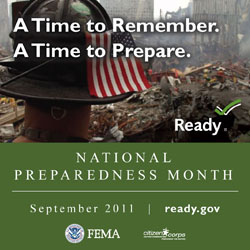 This September marks the ten year anniversary of 9/11
This September marks the ten year anniversary of 9/11
As we take time to remember those lost, it is an opportunity to make sure we are prepared for future emergencies. National preparedness month was founded after 9/11 to increase preparedness in the U.S. It is a time to prepare yourself and your family for an unexpected emergency.
In prior years, we have experienced tornadoes, blizzards, floods, wildfires. Being prepared for these emergencies, as well as others that we don’t often consider such as water main breaks, or long term power outages will help keep you and your family safe and healthy when one occurs.
This September, please prepare and plan in the event you must go for three days without electricity, running water, access to a supermarket, or local services. While the task seems overwhelming, it can be broken down into three steps:
1. Get a Kit: Keep enough emergency supplies on hand for you and those in your care. Water, non-perishable food, first aid supplies, prescriptions, flashlight, battery-powered radio. For a complete checklist, visit Ready.gov
2. Make a Plan: Discuss, agree on, and document an emergency plan with those in your care. Visit Ready.gov for sample plans. Work with neighbors, coworkers, and others to build community resilience. Test or rehearse your plan. Identify the portions that don’t work well, and modify them until they do.
3. Be Informed: Free information is available from federal, state, and local resources. You can find preparedness information by:
- Accessing Ready.gov to learn what to do before, during, and after an emergency
- Contacting the Clinton County Emergency Management Agency to get essential information on hazzards specific to Northwest Missouri, information on local emergency plans, ways to get information before and during an emergency, and how to sign up for emergency alerts.
- Contacting your local fire department and police department. Ask about information on preparedness.
Police, fire, and ems may not be able to reach you quickly during a disaster. Obstructed roadways, and overwhelming demand for emergency services during a wide-spread emergency may hinder their response. The most important step you can take in helping your local responders is being able to take care of yourself and your family; the more people who are prepared, the quicker the community will recover.
For further information, please visit the Clinton County Emergency Management “Get Prepared” page, Ready.gov, Missouri Ready in 3, Prepare Metro KC, and the Missouri State Emergency Management Agency’s webpage. Call 1-800-BE-READY for free information.